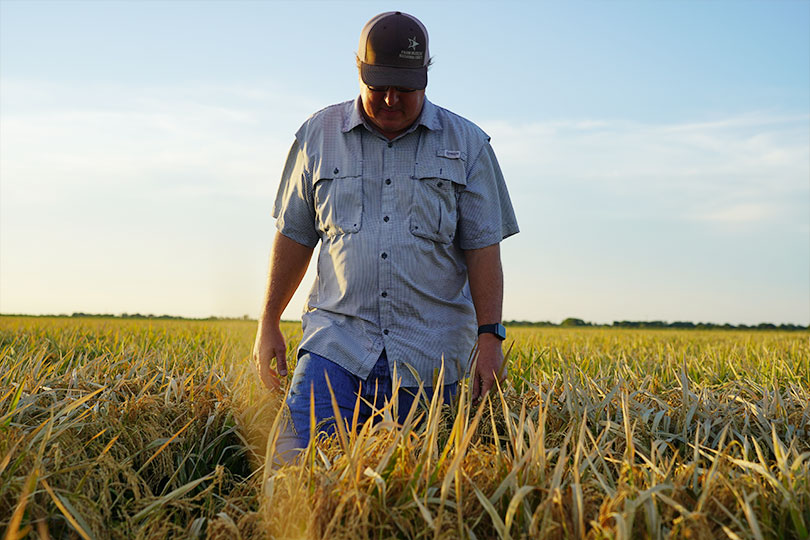By Julie Tomascik
Editor
No water from the Highland Lakes will be available to farmers for the second growing season. The Lower Colorado River Authority (LCRA) made the announcement July 1, citing severe drought conditions.
The decision impacts interruptible water customers in the Gulf Coast, Lakeside and Pierce Ranch agricultural operations in Colorado, Wharton and Matagorda counties.
Paul Sliva is one of the many farmers affected.
“It’s tough, especially this year,” Sliva, who farms south of Bay City, said. “We do have somewhat good prices for rice, but diesel, fertilizer, chemical, seed—everything is up. And now we won’t have water for our ratoon crop, our second crop.”
The water management plan set by the Texas Commission on Environmental Quality requires LCRA to cut off water from the Highland Lakes to interruptible customers during drought conditions to ensure water supplies will be available to cities, businesses and industries.
LCRA provides water to firm and interruptible water customers. Firm customers are entities such as cities, municipal utility districts, businesses and power plants that purchase water that will be available. Interruptible customers are agricultural customers in the lower basin that purchase water that is limited or cut off during droughts.
LCRA determines the amount of water available for interruptible customers on July 1 for the second growing season based on the combined storage in lakes Buchanan and Travis and the duration and intensity of the drought.
Water levels in lakes Buchanan and Travis—the two water supply reservoirs in the Highland Lakes—were 1.278 million acre-feet as of July 1. The lakes haven’t been full in over 18 months, and the cumulative inflows are below the inflow intensity test set in the water management plan, according to LCRA.
And the Hill Country watershed that feeds the Highland Lakes is considered to be in an extreme drought.
“The majority of the Hill Country has only received between five and 10 inches of rain since October, well below average, and the amount of water flowing into the Highland Lakes from January through June is the lowest on record for that six-month period,” said John Hofmann, LCRA executive vice president of Water. “We have plenty of drinking water supplies available in the Highland Lakes, but we need to start tapping the brakes on water use because we don’t know when this drought will end.”
And hopes are drying up right along with the chances for a second crop.
“We haven’t been feeling great for a while,” Sliva said. “Our water costs have gone up so much that it’s tough being a rice farmer. We went from $30 an acre 11 years ago to $140 an acre. It’ll be tough to make any money without having that second crop. Quite a few of us are worried about not being able to make a profit on this crop this year.”
That’s because the second crop requires few inputs, so farmers see more profit from this crop.
Harvest of the first crop begins in mid to late July. After the first crop is harvested, farmers start water back on the rice for the second crop to start growing.
Sliva noted the rice needs water on it for about two months to make the second crop.
“This is hard to deal with,” he said. “We don’t really consider it two crops, just a continuation of the one crop. Insurance isn’t going to help with this.”
Sliva has been growing rice for 30 years and experienced water curtailments before.
LCRA curtailed the amount of water from the lakes available during 2018 and cut off water from the lakes in 2012 through 2015 for interruptible customers.
But Sliva’s optimism is running low.
“I’m not real optimistic we’ll get water next year, but after harvest, we’ll get prepared for next year just like we always do,” he said. “That’s all we can do.”
And hope and pray the rains come soon.


So the people in the city can water their lawns food should come first
Cut the use of water on golf courses. Food and livestock are assets and well needed what a waste to the vast majority who don’t play golf
What a mess! Water the farmers before the businesses and corporations.
A lot of Golf Courses use “Grey Water) to irrigate